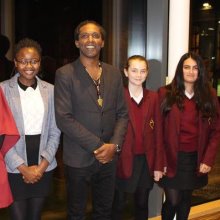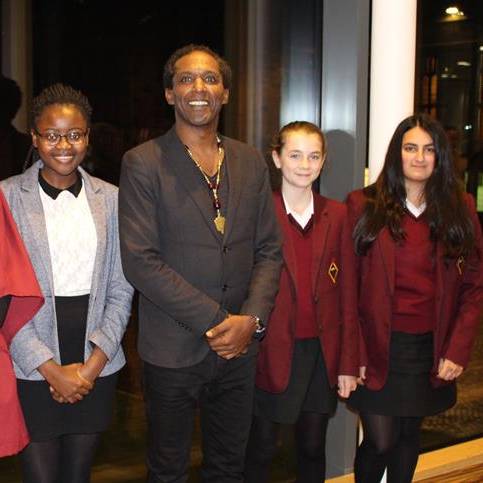
Lemn Sissay, writer and Chancellor of the University of Manchester, held the Great Hall of Bolton School Girls’ Division mesmerised during an emotional rollercoaster of an evening. Interspersing readings from his new collection Gold from the Stone with moving and raw recollections of his childhood, Lemn transfixed the audience. Opening the evening with the epic Morning Breaks, he immediately pitched the listeners into a tale of the narrator clinging onto a branch for years before choosing to finally let go, having, throughout all his time in suspension, grown wings which enabled him to take flight. Whilst it served as a telling analogy for his own life, he apologised to anyone fresh to poetry readings as this was a weighty introduction but, he said, “I wanted to push you”.
Lemn told how in 1967 his mother, aged 21 and unaware that she was pregnant, left Ethiopia to study in England. Once her pregnancy became known, she was moved from Bracknell, Berkshire to Plodder Lane, Bolton. He recalled his days growing up in Leigh, near Atherton where he was “the only black in the village” and his time walking the streets of Daubhill selling cleaning products door to door. Moving unexpectedly from subject to subject, he thanked the girls for producing such wonderful flags devoted to his poetry which he had seen on the English corridor and said had truly moved him. Then it was time for a love poem, which he believes is read at a wedding at least every two weeks and is available for free online: Invisible Kisses. This was quickly followed by Suitcases and Muddy Parks which spoke of proving yourself to your parents and he fleetingly remembered how his own mum and dad went off one way, whilst he went off with a social worker. Lightening the mood with the short, punchy Sarcasm he recalled how he wrote it in his Batman boxer shorts outside the backdoor of his house, his girlfriend having thrown him out after a row!
It was followed by Some Things I Like, which he said he had recounted to a girlfriend after she had asked him to tell her something about himself. He said, and we almost believed him, that he had shushed the restaurant and then stood on the table and forcefully delivered the poem.
The poem Emperor’s Butterfly Maker paid tribute to the artists and entertainers who fill our leisure time – he reminded the audience that once we have made our money we turn to music or poetry or art or literature, all of which have been imagined by someone. Even this Great Hall, he reminded the audience, had been imagined by an architect before it had been built.
And then Lemn spoke elegantly and measuredly as he delivered a cathartic unburdening of his formative years. His mother, on arriving in the UK, asked for him to be temporarily fostered as she needed to study; she would not sign papers allowing him to be adopted. A social worker placed Lemn with white Christian foster parents, David and Catherine Greenwood, who lived in Ashton-in-Makerfield. He had a brother and sister, Christopher and Sarah, and then Mrs Greenwood had another child, Helen. He recalled how becoming 12 years old, he started to develop into an adolescent and told the odd lie and stayed out late occasionally. His parents, unaccustomed to dealing with a young man, said he “had the devil inside him” and had him put in a children’s home. Once in the care system, he became known as “Chalky White” and was moved to a new home each year, ending up at Woodend Assessment Centre, near Westhoughton. During this time, no care worker knew him for beyond a year and meanwhile he had lost his parents, his siblings and other family, his friends, his first girlfriend, his town and his identity. As he moved into adulthood he was given his birth certificate and saw that his real name was Lemn Sissay and that his mother was called Yemarshet. He told how he still had “NG” tattooed on him (for Norman Greenwood) but at that point changed his name and started the search for his mother who he finally tracked down in Gambia, where she worked for the United Nations. She showed him a letter that she had written in 1968, 4 months after he had been born, in which she pleaded, to no avail, that he be given back to her to live with his own people. It took her nine years before she revealed who his father was and Lemn discovered he had been a pilot for Ethiopian Airlines and had died in a crash in 1974. He spoke of finding wreckage from the crash in the documentary “Internal Flight” which can be viewed on YouTube. He reflected how he had since forgiven his foster parents, saying they “did the best they could” and he had also received apologies from Wigan Council. He said with age had come wisdom and he realised that bitterness rots the vessel that carries it; forgiveness for him has given him great release.
Answering questions, he said he is still angry but now it is more defined and he does not maintain the same anger of his youth. He said he now tries to put all his energy into projects that help children in care. His own inspiration in poetry has come from Coleridge’s Rime of the Ancient Mariner.
Lemn thanked the audience, saying: “You have been a blessing and shared my story. I appreciate it.”
The lecture was the latest in a series of Arts and Science presentations which are taking place at the School in the evenings and are open to the general public.























